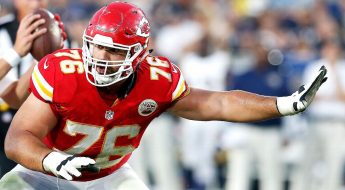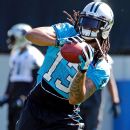Humble beginnings paved way for Terrell Owens, who misses HOF
SANTA CLARA, Calif. — Years after he’d coached a then-little-known receiver named Terrell Owens at the University of Tennessee-Chattanooga, Buddy Green was walking through the bowels of Lincoln Financial Field in Philadelphia when a security guard stopped him.
By that time, Green was working as Navy’s defensive coordinator, and his team was preparing for its annual showdown against Army. But the security guard had something else on his mind.
“He said, ‘I just want to tell you, you’re the SOB that’s responsible for all this,’” Green said. “I said, ‘What?’ He said, ‘You were so hard on Terrell in college that when he got away from you he had to break loose and celebrate. You’re responsible for all of this. Why were you so hard on him in college?’”
Green laughed then as he does now recalling the story, but the truth is that Owens, who sits on the cusp of the Pro Football Hall of Fame — a brash NFL personality about whom security guards might complain — comes from far more humble beginnings. For the second year, Owens was named among 15 finalists, but fell below the 80 percent requirement and was not voted into the Pro Football Hall of Fame on Saturday.
It wasn’t so much that Green was hard on Owens as it was Owens seemed to trust Green could help him get where he wanted to go. Two years before Green arrived at Chattanooga, the coach was Buddy Nix, who would go on to become the general manager of the Buffalo Bills in 2009 but coached in Chattanooga from 1984 to 1992.
As the story goes, Nix and his staff were scouting and recruiting a receiver named Derek Hall at Owens’ Benjamin Russell High in Alexander City, Alabama. Owens, who was known more for his basketball and track ability than football at that point, didn’t even crack the starting lineup until that night because of another receiver’s illness. Owens scored a touchdown that night and earned a partial scholarship with the opportunity to pursue multiple sports at Chattanooga.
Owens arrived in Chattanooga not lacking for height at 6 feet, but with a slender, 177-pound frame, that made it fair to wonder if he could withstand the rigors of the college game, let alone playing basketball and running track. Owens didn’t make much of a mark as a freshman, and he and Nix had their share of run-ins, usually centered on Owens’ propensity for being late or missing meetings entirely.
Nix departed before Owens’ sophomore season, and Chattanooga replaced him with Tommy West, who lasted one year in the job, although Owens flashed potential in that sophomore season.
Upon his arrival in Chattanooga, Green had no preconceived notions about Owens, other than viewing him as a potential offensive centerpiece. Green wanted to get Owens the ball in as many ways as possible, and Owens rewarded Green’s faith by volunteering to play on every special-teams unit in addition to his role on offense.
“You have got to think about this if you were a college player, I was the third head coach that they’d had in three years,” Green said. “When you are a college player and you’ve got that unstable situation in terms of building trust in your players and what you try to do, I had absolutely no problems with Terrell. He worked his butt off for me.”
 Wide receiver
Wide receiver
6-3, 222
Tennessee Chattanooga
1996-2003 San Francisco 49ers, 2004-05 Philadelphia Eagles, 2006-2008 Dallas Cowboys, 2009 Buffalo Bills, 2010 Cincinnati Bengals
• Played 219 games over 16 seasons
• 15,934 receiving yards are second in NFL history
• 1,078 receptions are sixth in NFL history
• 153 receiving TDs are third in NFL history
• Six-time Pro Bowler
• Five-time first-team All-Pro
• NFL All-Decade Team of 2000s
In the process, Green identified Owens as someone who had the potential to play in the NFL, but he knew Owens was going to have to make some sacrifices to get there. As the sixth man on a basketball team that reached the Sweet 16, Owens wasn’t in a hurry to give up a sport that was his first love. But Owens’ commitment to hoops prevented him from putting in the work in the weight room to build up his body for a potential NFL bid.
So Green explained to Owens the benefits of skipping basketball as a senior in order to prepare for the NFL. Owens became a staple in the weight room and quickly added muscle.
“He trusted me and what I laid out for him, the things necessary to get that opportunity to play on the next level,” Green said. “You’ve got the height and framework, but you’ve got to change your body. I think he went from a skinny little, whatever height at the time to a guy who was well put together and solid and strong by the time he was drafted. He definitely changed his body those last two years. I think that was a matter of trust. I don’t think he ever would have given up basketball if he hadn’t trusted me that these are some things you have to do if you want people to take a look at you to play on the next level.”
As it turned out, Owens began getting attention from around the NFL, but the San Francisco 49ers clearly had the most interest. Green recalls a Niners scout who regularly traveled to Chattanooga to visit with Owens. On one visit, it was raining outside and the scout wanted to see Owens run a 40-yard dash. Owens agreed to run and ended up doing so on a small stretch of concrete in the stands of the football stadium.
It was little surprise to Green when the Niners drafted Owens in the third round in 1996. It was a perfect fit for Owens, who grew up idolizing legendary 49ers receiver Jerry Rice. The chance to learn from Rice set Owens on a path to one of the most prolific careers by a wideout in NFL history. After a 15-year career, he ranked second in NFL history in receiving yards (15,934), seventh in receptions (1,078) and third in receiving touchdowns (153), a body of work only surpassed by Rice himself.
Sure, Owens was at the center of controversy along the way, but it never stopped him from playing at the level of an all-time great.
“If you look at the numbers, I don’t see any reason why it shouldn’t happen,” Green said. “I’ve had too many guys over the years when he was playing, that call me and say, ‘Was he this, was he that, was he trouble?’ Well, no. He was the last guy to leave the field for me. He worked his tail off for me.”





